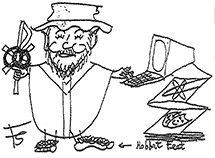We are always forgetting things - and then trying to remember.
How do we try to remember? we scrabble around trying to connect something we know with the name or date or person we can’t remember.
Then usually we give up, or take a rest, “Sleep on it!” some people advise.
And while our attention is diverted elsewhere, our unconscious processes go on until the answer POPS UP. Just like that. Then we check to see if we are right, for not everything that pops up is always the right answer.
This process of remembering has the same outline that Henri Poincare, the famous French mathematician (died 1912) used to describe the process at which he arrived at some of his remarkable discoveries, such as those in group theory, non-Euclidean geometry and theory of chaos.
Poincare called these stages Preparation (scrabbling around), Incubation (taking a rest), Illumination (Popping-up) and Verification (checking up).
Michael Polanyi (1891- 1976) was a physician, physical chemist, then became as distinguished a philosopher as Poincare had been a mathematician. Michael was also as distinguished a philosopher as his son, our Canadian John Polanyi is a scientist, being a Nobel prize winner in chemistry. Michael picked up on Poincare’s analysis of the process of creativity, and extended it - through personal experience - to “the mental effort leading to the recovery of a lost recollection.”
He also listed as similar creative processes the creation of works of art, inventions, diagnoses, and “many other forms of guessing right.”
As I read this explanation, in Polanyi’s little book “Science, Faith and Society” first published by Oxford University Press in 1946, I read: “Among these I would include also the prayerful search for God.”
These words and this research have confirmed for me that the process by which we search for, listen to, wait upon, and verify our relation with God is the same human process that artists and scientist undergo as they follow their various vocations.
And I believe that because it is the same human spirit and mind and whole “self:” which pursues these very different ends, there is good reason to study the various subject-matters of science, art and faith, to see their relationship within the framework of human life.
One of the best non-theological descriptions of Christian (or other!) conversion or illumination is in Polanyi’s further words:
“All these processes of creative guesswork have in common that they are guided by the urge to make contact with a reality, which is felt to be there already to start with, waiting to be apprehend-ed…great discovery is the realization of something obvious; a presence staring us in the face, waiting until we open our eyes.” *
*Science, Faith and Society” Quotes are from the edition published by the University of Chicago Press in 1964, pages 34-5.

